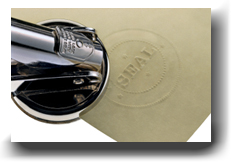Apostille, Certificate of Authority
The Apostille & Certificate of Notarial AuthorityASN Hot Tip September 2008-#1
The Situation: We received an email from a person who needed an apostille or certificate of notarial authority for her document that was destined for use in a foreign country.
The Client’s Dilemma: After performing the notarial act over the document in question, the notary pulled out a blank copy of an apostille, filled it in and attached it to the document himself. The notary’s client was skeptical and emailed ASN to ask if what the notary did was lawful.
The Answer: ASN has, in the past, received calls and emails from notaries asking what they have to do to be able to issue apostilles. Only the notary’s state appointing authority or “competent authority” can issue a certificate of notarial authority or an apostille. Usually, this is the Secretary of State’s office, but may also be the county Clerk of Court, the Governor’s or Lieutenant Governor’s office, or Treasury Department.
Apostille—An apostille is an official document certifying that the notary who performed a particular notarial act was a notary in good standing at the time of the notarization. It also certifies the authenticity of the notary’s signature and seal. Documents that will require an apostille will be destined for countries that have signed the Hague Convention on Abolishing the Requirement of Legalization for Foreign Public Documents. It is important to understand that the apostille does not authenticate the contents or effect of the document in any way. It pertains strictly to the notary’s authority to perform notarial acts on the date of the specific notarization and the authenticity of the notary’s signature and seal on that particular notarial certificate.
Certificate of Notarial Authority—Documents destined for jurisdictions within the U.S., or for countries that have not signed the Hague Convention, will not receive an apostille but will receive a certificate of notarial authority. The format of this certificate can differ according to the state that issues it. This certificate also authenticates the notary’s signature, seal and authority to act as a notary on the date that the notarial act was performed. It does not authenticate the contents or effect of the underlying document in any way.
It is the responsibility of the notary’s client to obtain the apostille or certificate of notarial authority from the appropriate state agency. As a courtesy, the notary can provide the client with instructions as to how to obtain these certifications. The process usually involves the client mailing or physically taking the original, notarized document to the state office that provides authentications. The state authentications office will generally require a letter stating which country or state the document is going to so the proper certificate may be issued. There will be a fee charged for each apostille or other certificate of authority.
Visit our website and click on “Notary Information by State” for contact and fee information for apostilles and certificates of notarial authority in your state. Use that information as a starting point for familiarizing yourself with your state’s authentication process.
Occasionally, the receiving country will require an additional authentication from the United States Department of State, Office of Authentications, in Washington D.C. In order to obtain a federal authentication, the document must first be authenticated by the state authentication authority.
You will find more information at the website of the Office of Authentications: https://travel.state.gov/content/travel/en/legal/travel-legal-considerations/internl-judicial-asst/authentications-and-apostilles.html.
Questions, comments on this Hot Tip? Email support@asnnotary.org
Apostilles and Certificates of Authority
American Notary, Issue 2006-#6
Sometimes when a notarial act is performed involving a document that is headed to another state or a foreign country, the receiving state or country requires a "certificate of authority" from the notary's commissioning authority. This official document authenticates the notary's authority, stating that the notary was duly commissioned on the date of the notarial act. When the document in question is headed to certain foreign countries, the certificate of authority takes a different form called an "apostille."
It is not your responsibility to obtain apostilles or certificates of authority, but you should be familiar with the process in order to be a good source of information to your clients.
Commissioning Authority—The governmental authority that commissioned you as a notary is the resource for a certificate of authority or apostille. Depending on the state, the commissioning authority can be the Secretary of State, Governor, Lt. Governor, individual County Probate Judge, Clerk of Superior Court, Superior Court Assistant Judge, Attorney General, or the Department of Licensing. (In the District of Columbia, it's the Mayor.)
The Process—Requests for a certificate of authority or apostille must be made in writing, and delivered to the notary's commissioning authority by mail or in person. The letter should explain why the certificate of authority or apostille is needed, and where the document is headed. A postage-paid, return envelope with either the address of the document custodian, or the address of the document's final destination, should be included. There is generally a processing fee that varies by state. The original document bearing the notary's completed notarial certificate must also be presented with the written request and fee.
Depending on where the document is headed overseas, your commissioning authority will know whether a certificate of authority or apostille is needed and will generate the correct document.
The commissioning authority will then verify the notary's signature and commission details against the official record. (For example, does the notary's signature on the notarial certificate match the sample on file? Was the notary's commission in effect and not expired on the date of the notarial act?)
If all is in order, the commissioning authority then completes a written certificate of authority, affixes an official seal, attaches the certificate to the document, and returns the document to the document custodian. Or, the document and certificate of authority may be sent to its final destination if the return envelope (submitted by the document custodian) displays the proper address.
In addition, some foreign countries may require federal authentication from the Department of State's Authentication Office in Washington, D.C. For federal authentication, the document custodian must submit the original, notarized document with its state certificate of authority, a letter stating why federal authentication is needed, and where the document is headed overseas. There is a $8 per document fee, payable by personal check or money order to U.S. Department of State (Visa or Mastercard accepted from walk-ins only).
Apostilles—For years, documents headed to foreign countries had to go through a multi-step process of "legalisation"-i.e., authentication-in order to be delivered to the intended foreign country. This remains true for some countries. In 1961, however, a number of countries including the United States entered into a treaty called the "Hague Convention Abolishing The Requirement of Legalisation for Foreign Public Documents" which greatly simplifies the authentication process.
Countries that signed this particular treaty agreed on a streamlined process of document "legalisation," and on a standardized certificate of authentication called an "Apostille." The treaty specifies the exact physical details of the apostille: it must be in the form of a square with sides at least nine centimeters long; and it must contain the exact wording set forth in the treaty. Your commissioning authority uses the apostille form for authenticating a notary's authority, when the related document is headed to a country that signed the Hague treaty.
Only countries that signed this particular Hague Convention may utilize the apostille, and only those countries enjoy the streamlined authentication process afforded by use of the apostille. Note: an apostille is not used when a document is going from one state in the U.S. to another U.S. state-a certificate of authority is used instead.
As stated earlier in this article, the process for obtaining an apostille is the same as for obtaining a certificate of authority. Your commissioning authority will know which form is appropriate, based on the destination of the document.
To review who your commissioning authority is, and where to write (or walk-in) for a certificate of authority/apostille, remember to visit ASN's web site, www.asnnotary.org. Click on "Notary Information by State" in the left-hand margin, then select your state.
Questions, comments on this Hot Tip? Email support@asnnotary.org
 Your data is safe with us! (read our privacy and security policy)
Your data is safe with us! (read our privacy and security policy)

